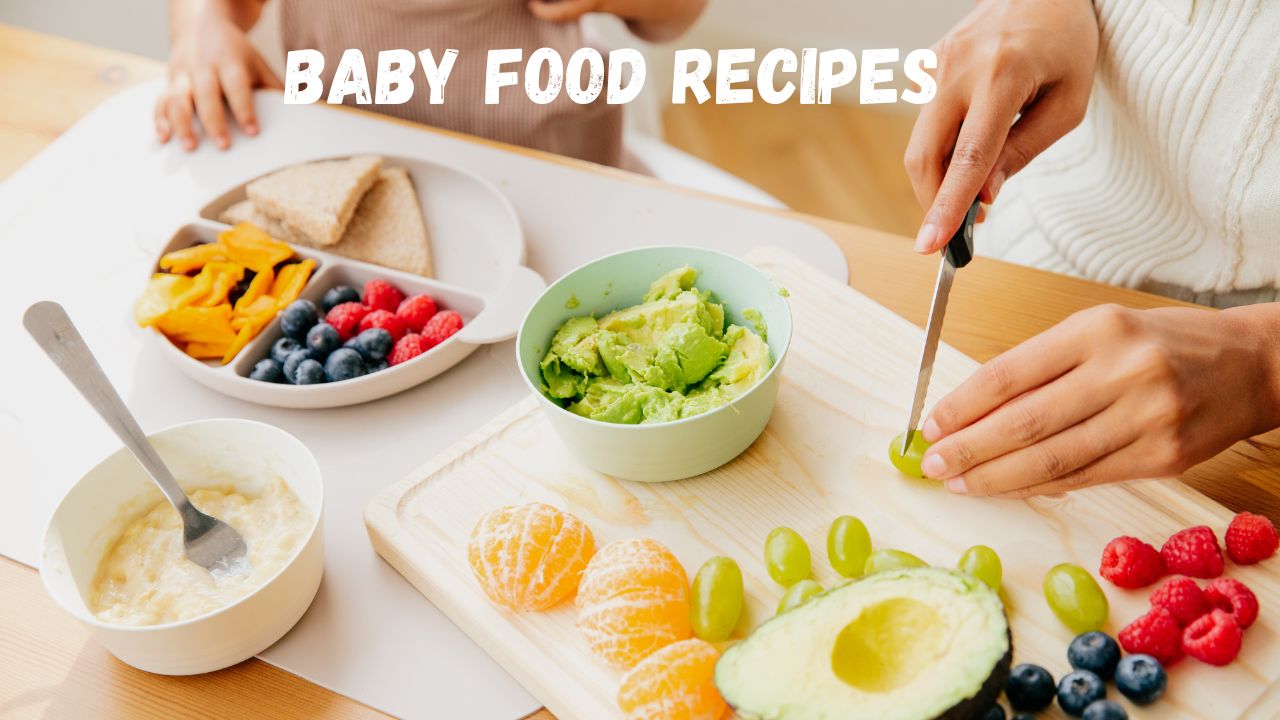Introducing solids to your baby is an exciting milestone. Making your baby food is a great way to ensure your little one gets fresh, nutrient-rich meals. Plus, it’s simpler than you might think. Baby food purees, like banana purees and green beans, are soft, blended foods often used to introduce solids, while baby-led weaning encourages babies to self-feed with finger foods.
Here’s a collection of easy, homemade baby food recipes that are wholesome and flavorful, perfect for babies aged 6 months and up.
Why Homemade Baby Food?
Homemade food for babies offers many advantages:
Freshness: You control the quality and freshness of the ingredients.
No Additives: Store-bought baby food often contains preservatives or added sugars. Homemade baby foods are pure and free from unnecessary ingredients.
Cost-Effective: Making baby food is usually more affordable than purchasing pre-packaged varieties.
Customizable: You can adjust textures and flavors as your baby grows and develops new tastes.
Baby Food Basics
Before diving into recipes, it’s important to keep a few things in mind:
Start Simple: Begin with single-ingredient purees to help identify any food allergies.
Soft and Smooth: For babies just starting on solids, food should be well-cooked and pureed to a smooth consistency.
Gradually Introduce Textures: As your baby becomes more comfortable eating, you can introduce more textured food.
Baby Food Recipes
Now, let’s explore some easy and nutritious baby food recipes!
1. Avocado Puree (6+ months)
Ingredients: 1 ripe avocado and A little breast milk, formula, or water (optional)
Instructions: Slice the avocado in half, remove the pit, and scoop out the flesh. Mash the avocado with a fork or blend in a food processor until smooth. If the puree is too thick, add breast milk, formula, or water to reach the desired consistency.
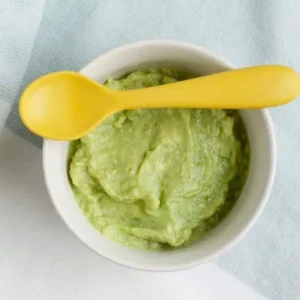
Why Avocados?
Avocados are packed with healthy fats, which are important for brain development in babies. They’re also rich in vitamins and minerals.
2. Sweet Potato Puree (6+ months)
Ingredients: 1 medium sweet potato, Water, breast milk, or formula for thinning
Instructions: Peel and chop the sweet potato into small chunks. Steam or boil the chunks until tender (about 15-20 minutes). Blend the cooked sweet potato in a food processor or mash with a fork until smooth. Thin the puree with water, breast milk, or formula as needed.
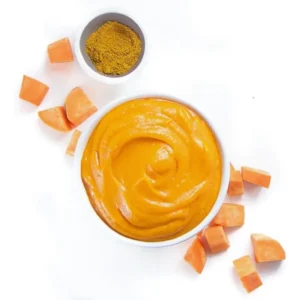
Why Sweet Potatoes?
Sweet potatoes are a great source of vitamins A and C, as well as fiber, making them an ideal first food for your baby.
3. Banana Oatmeal (7+ months)
Ingredients: 1/4 cup rolled oats, 1/2 ripe banana, Water or milk (breast milk, formula, or dairy if your baby is 12+ months)
Instructions: Cook the oats in water according to package instructions. Mash the banana and mix it into the oatmeal. If needed, add water or milk to thin the mixture to a baby-friendly consistency.
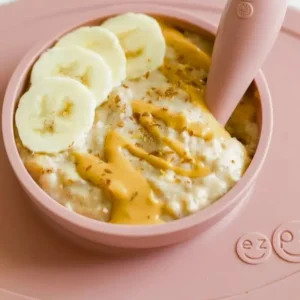
Why Oats and Bananas?
Oats are full of fiber and help with digestion, while bananas provide potassium and natural sweetness, making this a perfect breakfast or snack.
4. Carrot and Pea Puree (7+ months)
Ingredients: 1 large carrot, 1/4 cup peas (fresh or frozen), and Water for steaming
Instructions: Peel and chop the carrot into small pieces. Steam the carrot and peas together until both are tender (about 10-15 minutes). Blend or mash the veggies until smooth, adding water as needed for consistency.
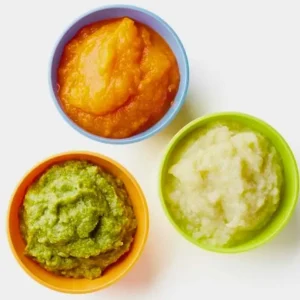
Why Carrots and Peas?
Carrots are rich in beta-carotene (great for eyesight!), and peas provide protein and vitamins K and C.
5. Apple and Blueberry Puree (8+ months)
Ingredients: 1 apple (peeled, cored, and chopped) and 1/4 cup blueberries (fresh or frozen)
Instructions: Steam the apple pieces until tender (about 10 minutes). Add the blueberries and cook for an additional 5 minutes. Blend the mixture until smooth, and let it cool before serving.
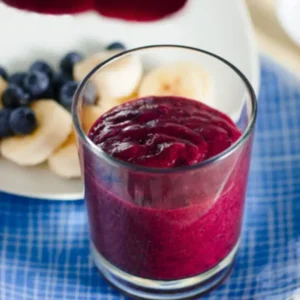
Why Apples and Blueberries?
This fruity combination is packed with antioxidants and vitamin C. It’s a sweet and healthy treat that your baby will love!
6. Chicken and Veggie Mash (9+ months)
Ingredients: 1/2 chicken breast (skinless and boneless), 1 small carrot (peeled and chopped), 1 small potato (peeled and chopped) and Water or low-sodium broth
Instructions: Boil or steam the chicken, carrot, and potato until fully cooked and tender (about 20-25 minutes). Shred the chicken and mash the vegetables together. You can also blend them to a smoother texture if needed. Add a bit of broth or water to moisten the mash.
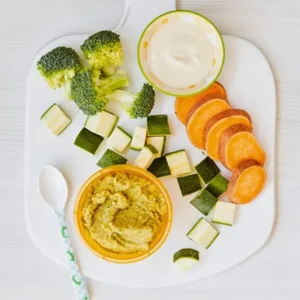
Why Chicken?
Chicken is an excellent source of protein, and when combined with veggies, it makes a well-rounded, nutritious meal for older babies.
7. Lentil Soup (10+ months)
Ingredients: 1/4 cup red lentils (rinsed), 1 small carrot (chopped), 1 small onion (chopped), 1 cup water or low-sodium broth
Instructions: In a pot, combine lentils, carrots, onion, and water or broth. Bring to a boil, then reduce heat and simmer for 20 minutes, or until everything is tender. Puree the soup for a smoother consistency or leave it chunkier for older babies.
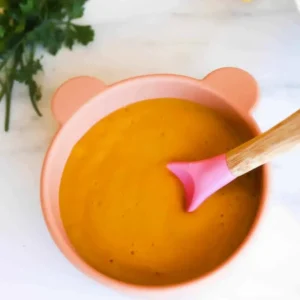
Why Lentils?
Lentils are a great source of plant-based protein and fiber, making them perfect for a growing baby’s diet.
8. Mango Yogurt (10+ months)
Ingredients: 1/4 cup plain full-fat yogurt and 1/2 ripe mango (peeled and chopped)
Instructions: Blend the mango pieces until smooth. Mix the mango puree with the yogurt and serve.
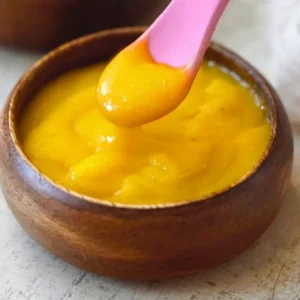
Why Mango and Yogurt?
Mango is rich in vitamin A and vitamin C, while yogurt provides calcium and probiotics for healthy digestion.
Tips for Storing Baby Food
Refrigerate: Store homemade baby food in airtight containers in the fridge for up to 3 days.
Freeze: You can freeze baby food in ice cube trays and transfer the cubes to freezer bags for up to 3 months. Just thaw the cubes overnight in the fridge or warm them up before serving.
FAQs About Baby Food Recipes
When should I start feeding my baby solid foods?
Most babies are ready for solid foods around 6 months of age. Signs of readiness include being able to sit up with support, showing interest in food, and the ability to hold their head steady. Always consult your pediatrician before starting solids.
What is the best first food for my baby?
Single-ingredient purees like Avocado, Sweet potato, Carrot, and Banana
These foods are gentle on the digestive system and packed with essential nutrients.
How do I know if my baby has a food allergy?
Introduce new foods one at a time, waiting 3-5 days before trying another. Common signs of a food allergy include:
Rash or hives, Swelling, Vomiting or diarrhea, and Trouble breathing.
If any of these occur, stop feeding that food and consult a doctor immediately.
How do I store homemade baby food?
Refrigeration: Freshly made baby food can be stored in airtight containers in the fridge for up to 3 days.
Freezing: Freeze baby food in ice cube trays. Once frozen, transfer the cubes to freezer-safe bags or containers and store them for up to 3 months.
Can I use frozen fruits and vegetables?
Yes, frozen fruits and vegetables are a convenient and nutritious option. Just ensure they’re plain, with no added salt, sugar, or preservatives. Steam or cook them before pureeing to make them soft for your baby.
How do I make baby food smooth enough?
For younger babies, ensure that the food is thoroughly cooked before pureeing. You can use a blender, food processor, or hand blender to achieve a smooth consistency. Adding water, breast milk, or formula can help thin out the food to make it more manageable for little ones.
Can I add spices or seasonings to my baby food recipes?
It’s best to avoid salt and sugar in baby food. However, you can start introducing mild spices around 8-10 months. Herbs like cinnamon, turmeric, and cumin in small amounts can enhance flavors and make the food more interesting.
You can also check our blogs on baby food and health and wellness.
Conclusion
Making your baby food is a rewarding and nutritious way to ensure your little one starts their food journey on the right foot. These easy recipes are packed with flavor, nutrients, and love—perfect for babies beginning to explore the world of food. Remember to always introduce new foods gradually and consult with your pediatrician if you have concerns about allergies or nutrition. Enjoy the journey of feeding your baby and watching them discover new tastes and textures!
